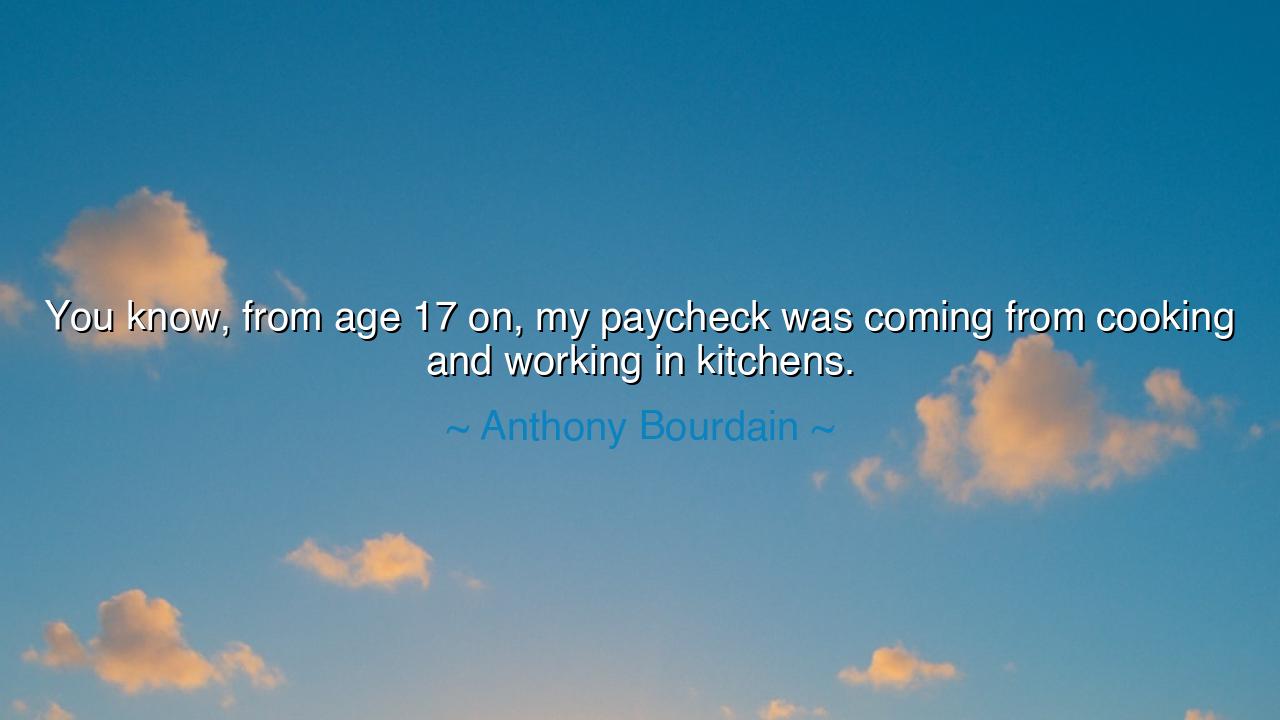
You know, from age 17 on, my paycheck was coming from cooking and






The words of Anthony Bourdain—“You know, from age 17 on, my paycheck was coming from cooking and working in kitchens.”—carry the weight of a life shaped by labor, discipline, and devotion. To the untrained ear, they may sound simple, even casual, but to those who listen closely, they speak of a sacred apprenticeship: the journey of a soul forged by work. These are the words of a man who found his identity not in privilege, but in the fire and noise of the kitchen—a place of chaos and creation, of humility and mastery. In them lies the ancient truth that craft is not merely a profession, but a path toward understanding one’s self and one’s place in the world.
At seventeen, the age when most are still dreaming idly of the future, Bourdain was already standing among the clatter of pans, the hiss of steam, and the scent of roasted flesh. The kitchen became his temple, his battlefield, his school. From that moment, his paycheck, though small, was sacred—it was proof that his hands, his sweat, and his effort could turn labor into livelihood. His words recall a time when a man’s worth was measured not by titles or appearances, but by what he could make with his own two hands. It was through the heat of kitchens that Bourdain learned the first laws of life: respect for effort, endurance through exhaustion, and the quiet dignity of those who toil unseen.
In this, he stands in the lineage of craftsmen from ages long past—men and women who shaped stone, wood, and flame, and who found in their craft the rhythm of existence. The blacksmith, the baker, the carpenter—all knew, as Bourdain knew, that the truest form of knowledge comes not from books, but from the repetition of honest work. As the philosopher Epictetus once said, “No great thing is created suddenly.” So too, the chef becomes great not through fame, but through a thousand burned fingers and sleepless nights. When Bourdain spoke of his life in kitchens, he was not boasting of success; he was honoring the grind, the apprenticeship, the long years of becoming.
There is also in his words a quiet rebellion against the illusion of glamour. Though the world came to know him later as a traveler, writer, and philosopher of food, he never forgot where it began—behind the stove, in the noise and sweat of unseen labor. For in the kitchen, there is no pretense. One cannot fake hunger, heat, or exhaustion. The kitchen, like life, demands honesty; it humbles all who enter. Bourdain’s journey reminds us that the roots of greatness are not planted in comfort, but in struggle. His paycheck at seventeen was more than money—it was initiation, the beginning of a lifelong conversation between effort and meaning.
Consider the example of Michelangelo, who as a young apprentice to Ghirlandaio swept the floors and mixed paints before he ever touched marble. He too learned that mastery begins with servitude. The artist, like the chef, must first labor in obscurity, refining the hand and humbling the ego. Bourdain’s youth in the kitchen mirrors this same truth: that greatness is born not in inspiration, but in discipline; not in glory, but in the willingness to return, day after day, to the work that shapes the soul. In both art and cuisine, repetition is revelation. The steady rhythm of practice becomes a kind of prayer.
Yet Bourdain’s reflection is not only about labor—it is about belonging. The kitchen was his tribe, his family, his proving ground. Among the cooks, the dishwashers, the waiters, he found a raw and imperfect brotherhood—a world where background mattered less than competence, where trust was earned through effort, and where humor survived even in the heat of hardship. To say that his paycheck came from cooking is to say that his life was intertwined with that world—the world of the working class, where each meal served is an act of creation, and each shift survived is a small triumph of will. It was here that Bourdain’s philosophy of respect for all people, all food, and all cultures was born.
So, what lesson can we take from these words, O listener? It is this: honor the work that shapes you. Whether you labor in kitchens or classrooms, fields or offices, treat your craft as sacred, for it is through work that the soul finds meaning. Begin humbly, endure faithfully, and remember that greatness does not spring fully formed—it is built through seasons of persistence. The paycheck is not just currency; it is the echo of your effort, the tangible proof of your place in the world. Let it remind you that you are capable, that your time and energy matter, that through work, you forge both livelihood and identity.
In the end, Anthony Bourdain teaches us that the kitchen—and by extension, life—is a forge. It burns, it humbles, but it also refines. From the fire of his youth to the wisdom of his later years, he remained a servant of the flame, a pilgrim of the palate, and a witness to the dignity of labor. His words remind us that the truest wealth lies not in what we are given, but in what we have earned—and that in every act of honest work, no matter how small, there is the making of a human being who has truly lived.






AAdministratorAdministrator
Welcome, honored guests. Please leave a comment, we will respond soon